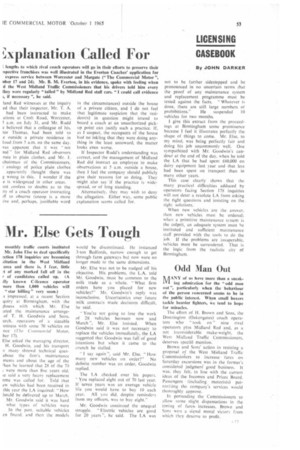i]xplanation Called For CASEBOOK
Page 55

If you've noticed an error in this article please click here to report it so we can fix it.
lengths to which rival coach operators will go in their efforts to preserve their spective franchises was well illustrated in the Everton Coaches' application for express service between Worcester and Margate ("The Commercial Motor ", n ber 17 and 24). Mr. B. M. Everton, in his evidence, spoke with feeling when d the West Midland Traffic Commissioners that his drivers told him every they were regularly "tailed" by Midland Red staff cars. "I could call evidence if necessary ", he said.
land Red witnesses at the inquiry ed that their inspector. Mr. T. A.
had been instructed to make ations at Croft Road, Worcester, 5 a.m. on July 31, and Mr. Rudd • believed that a colleague of his, tor Thomas, had been told to e outside a private residence in toad from 5 a.m. on the same day. vas apparent that it was not nal" for Midland Red observers rate in plain clothes. and Mr. J. chairman of the Commissioners, : analogy of police plain clothes apparently thought there was g wrong in this. I wonder if the e is widespread in other areas. ust confess to doubts as to the :ty of a coach operator instructing if to observe (snoop is a more Ave and, perhaps, justifiable word
in the circumstances) outside the house of a private citizen, and I do not feel that legitimate suspicion that the resident(s) in question might intend to board a coach at an unauthorized pickup point can justify such a practice. If, as I suspect, the occupants of the house had no inkling that they were doing anything in the least untoward, the matter looks even worse.
If Inspector Rudd's understanding was correct, and the management of Midland Red did instruct an employee to make observations at 5 a.m. outside a house, then I feet the company should publicly give their reasons for so doing. They might also say if the practice is widespread, or of long standing.
Alternatively, they may wish to deny the allegation. Either way, some public explanation seems called for. not to be further sidestepped and he pronounced in no uncertain terms that the proof of any maintenance system and replacement programme must be tested against the facts. "Whatever is done, there are still large numbers of prohibitions." He suspended 10 vehicles for two months.
I give this extract from the proceedings at Birmingham some prominence because I feel it illustrates perfectly the shape of things to come. Mr. Else, to my mind, was being perfectly fair and doing his job uncommonly well. One sympathized with Mr. Goodwin's candour at the end of the day, when he told the LA that he had spent £60,000 on dairy equipment last year and that less had been spent on transport than in many other years.
This case clearly shows that the many practical difficulties adduced by operators facing Section 178 inquiries will not deter a resolute LA from asking the right questions and insisting on the. right solutions.
When new vehicles are the answer, then new vehicles must be ordered: when a primitive maintenance system is the culprit, an adequate system must be instituted and sufficient maintenance staff provided with the tools to do the job. If the . problems are insuperable, vehicles must be surrendered. That is the logic from the realistic city of Birmingham.
Odd Man Out
MANY of us have more than a sneaking admiration for the "odd man out ", particularly when the behaviour of the person concerned seems to be in the public interest. When small boxers tackle heavier fighters, we tend to hope for miracles.
The effort of H. Brown and Sons, the Donnington (Oakengates) coach operators who took on" nine rival operators plus Midland Red and, as a not inconsiderable make-weight, the West Midland Traffic Commissioners, deserves special mention.
Brown and Sons' action in resisting a proposal of the West Midland Traffic Commissioners to increase fares on Saturday excursions was in the former's considered judgment' good business. It was, they felt, in tine with the current ideas of the Incomes and Prices Board. Passengers • (including motorists) patroni7.ing the company's services would thoroughly approve.
In persuading the Commissioners to allow some slight dispensations in the timing of fares, inereases, Brown and Sons won a signal moral victory from which they deserve to profit.












































































































































































